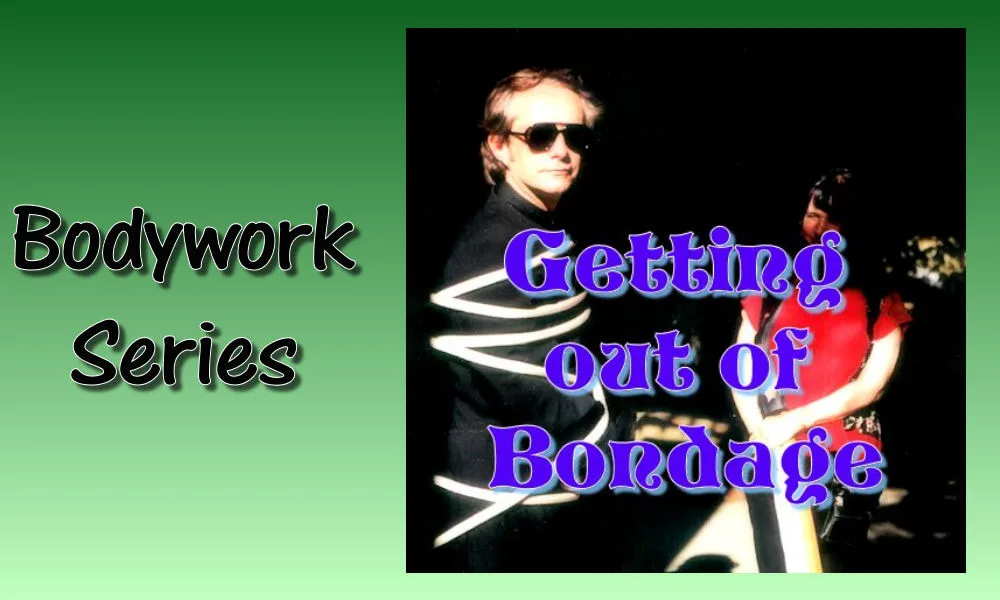- Untwisting
- Getting out of Bondage
- Bodywork
- Body Gates and the Path to Self-Knowing
- My Husband and My Pelvis
- Drama and Being Twisted
Getting out of Bondage — sometimes, the way out is the way through — you gotta figure out who you are, and go for it — without regard to “normal.”

My first and most popular book,
This Endless Moment.
Learn to live a full and satisfying life.
Last time, I wrote about addiction to pain
I was making the point that while pain might be a natural occurrence — an “I hit my thumb with a hammer” kind of thing — it’s also a drug of sorts. Many people “get off” on feeling “bad,” and twist their reality to have more of it.
Relationships are a prime target
People get into relationships for lots of reasons, and for pain addicts, it’s to “feel hard done by.” They push and push, and when the push-back comes, they get to play victim. They set up un-winnable games, and have a great sense of satisfaction that once again they are in pain.
Many of my past clients did exactly this — they entered relationships that “made them” feel awful — punished.
People in bad relationships are sub-consciously meeting a deep need to feel pain. Engaging in screaming matches is the same thing as wanting to feel physical pain. Manipulation is a game to never quite get what you want.
“Bad relating” is just a matter of degree.
I used the illustration of my mom wanting to be the sickest person in the room. This was not a hobby… this was a deep-wired part of her personality. It drove many of her choices, including her choice to be 70 pounds overweight and to continue to pack in the sugar even after ending up with diabetes.
She found pleasure in her pain. Perhaps, if she had tried, she could have found another way.
Some do it with work or school… they love pain and feeling “oppressed or prejudiced against,” so they set themselves up for conflict / failure so as to feel “normal.”
They can tell me their patterns… how they can’t seem to stop doing what they say they don’t want to do… And yet, each and every time, the go right back to setting things up to think they’re hard done by.
Call me silly, but if they have such a burning desire to feel failure, perhaps they could find another thing to strategically fail at.
I’d rather they come up with an alternative, as opposed to repeating what doesn’t work, and then judging themselves for doing it again.
In a sense, It “sounds like”: Finding a benign way to feel pain fully, without setting things up so that they simply end up playing the victim. Big price to pay for a little jolt of pain-pleasure.
Now, some therapists might argue that finding a way to experience pain without drama is “wrong, or not normal.” They try to get their clients to stop doing what they’re doing (me too… I hate watching people repeat ineffective behaviours…)
What this sounds like is, “Your addiction to pain-pleasure is wrong.” I disagree. It’s not the need to feel and process pain that is “wrong.” It’s using dumb ways to accomplish it that seems silly.
So for example:
- a person who needs to feel pain and who does it through BDSM no longer needs to create crappy relationships — they have their outlet.
- The person who needs sexual variety, and who sets up honest, open relationships, no longer has to sneak around.
- The person who want to experiment with something new can just go do it (safely), instead of coming up with tortured logic to justify their behaviour.
For example, lots of people make it difficult to admit out loud to being sexually turned on.
I wrote the following in my book, This Endless Moment
I once worked with a 21-year-old who, some months earlier, had broken up with a guy for having sex with a female friend of his. She’d gotten back together with him, and was engaged to him.
One evening she went to visit a male friend of hers and ended up having sex with him, on a pool table, no less. The next day she decided she had to dump her boyfriend because she was sure that having pool table sex with her friend meant she must love him and not her boyfriend. (Confused? She’s living this stuff.)
I asked her about the obvious: did she not see that she had just done what she’d dumped her boyfriend for (both had sex with a friend)? She looked confused and said “He did it for sex. I did it because I think I must love him.” I asked her what was wrong with being horny and doing something about it. She blushed, and repeated her mantra: “It’s not about sex, it has to be love.”
Her conflict is what we have been describing—she has a hard time admitting to being sexual and acting out of horniness, no trouble at all equating the wet and warm feelings with “true love.” She is so trapped in this thinking that she ended a 5‑year relationship because she had sex with someone else. Doesn’t that strike you as odd?
Repression simply leads to breakdown or explosion.
In Marty Klein’s book, Sexual Intelligence, he makes this same point. He calls out therapists who make themselves uncomfortable over the sexual activities of their clients. He says that often therapists are uncomfortable about sex and their own sexuality, and fall into the trap of declaring what “normal” is.
And then, they try to move their clients toward “normal.”

Except there is no normal.
Or better put, statistical norms exist, but are irrelevant on a case-by-case basis.
A simple example: a certain cancer has a 75% mortality rate. So, if you have that form of cancer, what’s your mortality rate — what’s going to happen to you?
Answer: there’s no way to predict. A statistical norm has nothing to do with an individual case.
Thus, the real thrust of Klein’s book, and of this blog, and of my work, and of my life, is this: you need to discover:
- who you are,
- what you want,
- be willing to stop judging what isn’t working, while
- experimenting with alternative behaviours,
- thus moving in a direction you choose
Not toward a statistical norm of “adult behaviour” (yuck! spare me!) but toward finding and enacting “you.”
Different from “the norm,” to me, is a wonderful, wonderful thing.
I see in my mind’s eye what could be. And many times people I know have discovered “amazing powers.”
To paint. To create. To build excellent relationships.
The sexual explorers have discovered all kinds of orgasmic delights. Polyamory. BDSM as a tool for letting go. Sexual intimacy projects.
Normal? By whose standard? According to whom?
Interesting? Hell, yes.

Others, the majority, stop themselves. They stay in dead relationships, or refuse to deal with the consequences of their behaviour. If they are slightly thwarted, they go running home to mommy.
They dig a hole over a decade, and then expect it to fill itself in, so they can walk our unscathed.
They cling to the past, blame others, (“Men!” “Women!”) or use substances to get through the day.
I despair a bit.
But then, I remember the ones who choose to fly, to explore, to ask for what they want, to open themselves to actually being exactly who they are.
They have a slightly shell-shocked look about them — “I can do that? Wow!” Or, “Oh! I thought that was weird and wrong, and now I see it feels good and is so right… for me!”
Thus I mention things that will challenge, stretch and turn you on. The world is sinking slowly in the muck of mediocrity, of rules and regulations… of normal, brittle, and boring.
I want to offer another way… and this is it.
.

